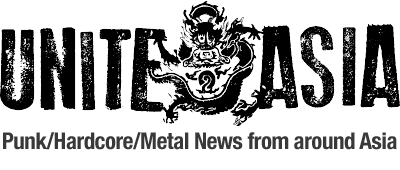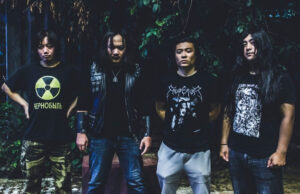The Buddha Boxing Dispatch [Newsletter] – Issue 16 Up Now [China]
By Unite Asia on January 1, 2021@uniteasia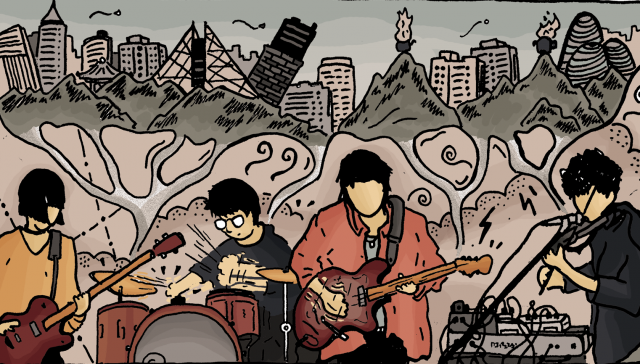
In order to introduce new types of content to the website, we have asked for permission from people around Asia who release weekly or monthly newsletters. One newsletter that we always love reading is called The Buddha Boxing Dispatch that we HIGHLY recommend you all to subscribe to by clicking HERE. The newsletter is put together by our friends Josh Feola and Krish Raghav both insane individuals with deep roots and an understanding of the Chinese underground music scene – and we mean ALL genres of music not just what we typically cater to (Hardcore, punk, metal).
They just released the 16th newsletter so with their permission we will now be including their newsletters on our site!
STOKED!
This newsletter contains updates on a forthcoming non-fiction comic book/graphic novel by Krish Raghav and Josh Feola about underground music in Beijing, covering the halcyon years between 1999 and 2019 when everything seemed possible and no noise was off-limits.
This newsletter will be short, fortnightly (lol) dispatches from us, featuring links, tunes, and drawings connected to alternative music from China. We’ll also be posting updates to the book here, and sharing some exclusive work-in-progress artwork! We’re hugely excited about where this is going, and thank you for joining us on the ride.
-Josh and Krish
Hey everyone,
It’s been a while.
Hope you’re all safe and well, wherever you are reading this from.
Consider this a consolidated update for the second half of 2020. At the moment, we’re in Beijing (Krish) and Texas (Josh), and you can probably guess from our long silence that it’s been a tough year.
The book has been in stasis, buried deep, waiting for us to sort out our lives so we can retrieve it. We haven’t gotten to that quest in nearly 8 months, but hey, we can finally say in December 2020 that we’re on the way.
Josh is writing again, and Krish is drawing. Here are some sketches from the current chapter we’re working through.
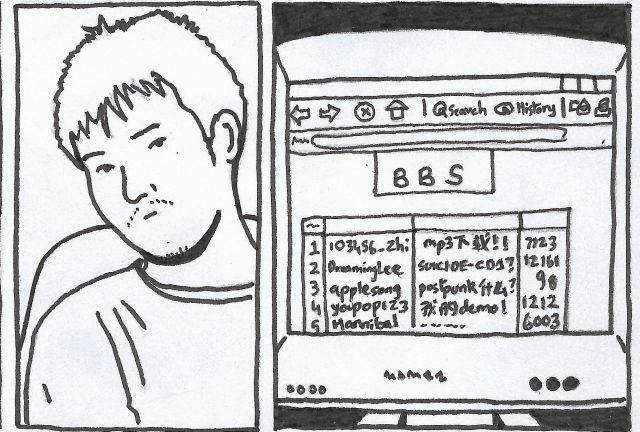
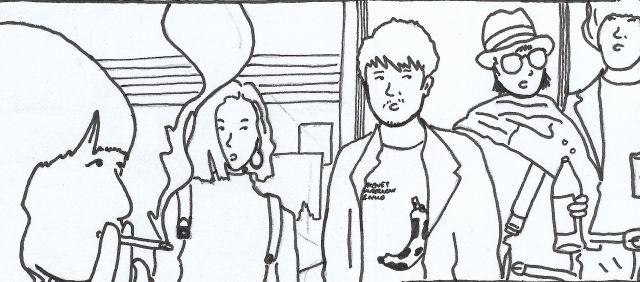
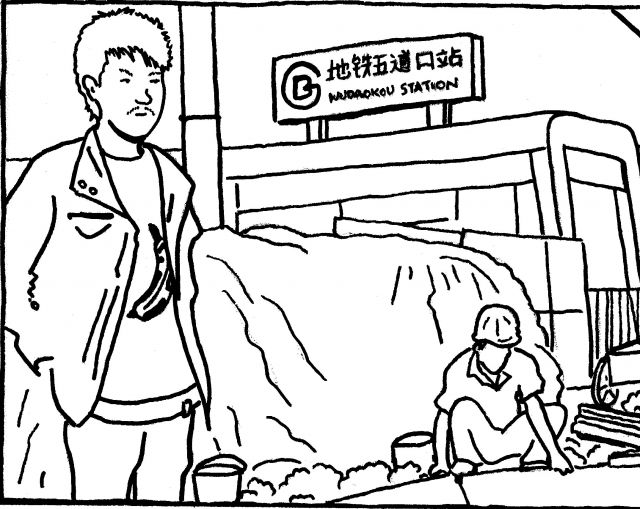
It’s also been a historic year for Beijing’s indie music scene—marking 2019, the notional end-point of our book’s timeline, an unexpectedly perfect conclusion to the sounds and scenes we’re covering.
The extraordinary 20-year run of ideas, bands and genres that was sparked by the late-90s introduction of the internet and the coming-of-age of the dakou generation has run its course.
What we’re seeing in the livehouses and live-streams of China in 2020 is the start of a new paradigm for what indie music is – it doesn’t connect back to this 1999-2019 era except as a “museum exhibit” taken out for occasional entertainment.
Two bands that had a huge 2020 will bear this out: Carsick Cars and Omnipotent Youth Society.
In 2010, both were at the peak of their creative careers—Carsick Cars played SXSW that year after releasing their sophomore album You Can Listen You Can Talk in 2009, while Omnipotent Youth Society released their landmark debut in November 2010.
The writer Britt Brown, in their brilliant profile of Flying Lotus for Wire magazine, talks about the “two kinds” of masterpieces in music: stepping stones and headstones.
“[Stepping stones], though not necessarily career defining, are significant achievements, praised as notable peaks in a mountain range full of differing heights.”
That was Carsick Cars. While acknowledging that they were perhaps a bit too courting of international media attention, these then-kids sparked a small revolution in pre-Olympics Beijing and captured a time, and a mood, that has not been replicated since. Those five years (2007–2012) produced so many colliding works across media – film, music, photography, graffiti, comics—that could be tied back to the D-22 scene they were at the nexus of.
The mountain range of new ideas was vast. It was heady, it was charged, it was special.
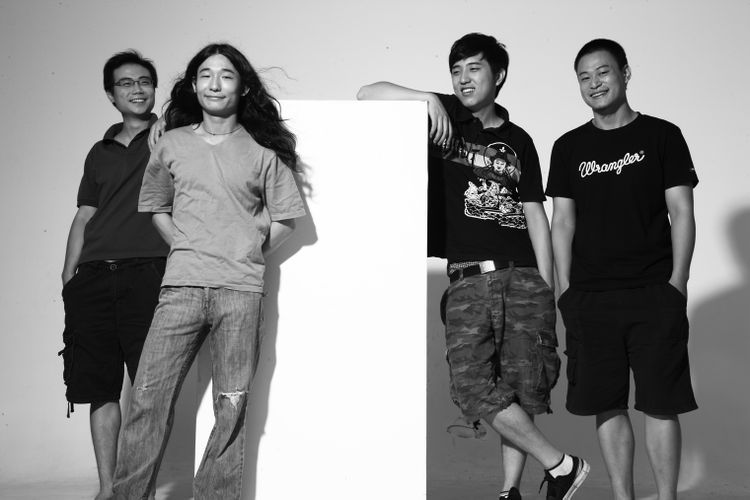
Omnipotent Youth Society, though, made something a bit different.
“Headstones are more faustian: a karmic deal with the universe where both sides get burned. In exchange for crafting someone so widely loved, society rewards the maker by sealing the work in marble and locking it away…where it’s gradually crushed under the weight of its canonisation. Over time, the album ceases to be an artefact and becomes an institution, with an agenda, identity and demographic all its own.”
Their 2010 album remains, to this day, singular and unparalleled but also unimitated. It was the (perfect) end of a road.
In 2020, Omnipotent Youth Society released their second album—in the works for a decade. The pre-orders were off-the-charts, nearly half a million fans paid 22RMB each upfront to listen.
How do you top a towering achievement? How do you follow up an album that defined a generation? You don’t. You go inwards and backwards. You sing about absurdity and disillusionment, about debilitating change. You make a second excellent album that is ultimately, tragically, still all about the first.
Carsick Cars went on a reality TV show, 乐队的夏天 The Big Band, that brought them hundreds of thousands of new fans. They released a curiously upbeat new song, Wake Me Up (sample lyric: the world is like a whirlpool / too fast to think through). But the Carsick Cars that appeared on TV was not quite the same band that their D-22 peers knew—many of their sly, subversive 2009 noise-rock anthems were not fit for TV and their “narrative”—one of community, shared discovery and collaboration – was cast aside for a simpler story about 3 effervescent rock stars.
In different ways, Carsick Cars and Omnipotent Youth Society represent the high watermark of the two decades that our book focuses on. In 2020, they’re bigger than ever, but paradoxically less “relevant” as anchors of a scene.
Our book is going to talk about how they got here, and the contradictions that come with exposure at scale in China. At the heart of it is a narrative that resists easy conclusions, or even tangible “development.” How do you tell a story about bands in stasis, about musical movements that become museum exhibits? Or perhaps “theme park ride” is a better analogy—a once-radical sound flattened into a predictable, snackable experience.
Yes, this is slightly provocative / too cynical, and we’d love for you to disagree! After 8 months of limbo, its refreshing to argue again about the niche specifics of Beijing indie music.
That’s our plan for this new year and beyond: more arguments, more discussions, new ideas and new work. It feels good to finally say: you’ll hear from us more often.
We survived 2020. We missed you all.
-Josh & Krish-
Featured

Japanese Hardcore Legends LOYAL TO THE GRAVE Make Massive Announcement
Unite Asia | April 6, 2024What a MASSIVE announcement by our fellas in Japanese hardcore legends LOYAL TO THE GRAVE. After 7 long years, the band has just announced a brand new 5 track...
Reviews
-
 Unite Asia | November 11, 2022
Unite Asia | November 11, 2022
REVIEW: Hong Kong Post-Hardcore Act Wellsaid Release Sophomore Album ‘Lurking’
-
 Unite Asia | April 3, 2022
Unite Asia | April 3, 2022
REVIEW: Hardcore Punk Act SPIT Release Self-Titled Debut Album [Taiwan]
-
 Unite Asia | August 31, 2021
Unite Asia | August 31, 2021
REVIEW: Melodic Death Metal Band Reborn Release EP [Vietnam]
-
 Unite Asia | August 4, 2021
Unite Asia | August 4, 2021
REVIEW: The Most Important Punk Rock Release of 2021 – The Rebel Riot [Myanmar]
-
 Unite Asia | June 15, 2021
Unite Asia | June 15, 2021
REVIEW: Metalcore Band Prompts’ ‘Magenta Smile’ Gets A Full Review [Japan]
-
Upcoming Releases
-
 Unite Asia | April 20, 2024
Unite Asia | April 20, 2024
Tech Death Metal On 11 String Bass? IMPENDING ANNIHILATION Drop EP [Japan]
-
 Unite Asia | April 20, 2024
Unite Asia | April 20, 2024
-
 Unite Asia | April 16, 2024
Unite Asia | April 16, 2024
-
 Unite Asia | April 14, 2024
Unite Asia | April 14, 2024
Straight Edge Hardcore Band EXCESSIONS Release Debut EP [Malaysia]
-
 Unite Asia | April 14, 2024
Unite Asia | April 14, 2024
Groove Metal Veterans Zygnema Release New EP ‘ICONIC’ [India]
-
Facebook
Recent Posts
-
 Unite Asia | April 20, 2024
Unite Asia | April 20, 2024
Hardcore Band ARCADIA Embrace Comeback Kid On Sick New Single [Philippines]
-
 Unite Asia | April 20, 2024
Unite Asia | April 20, 2024
Hardcore Band KNIFE STICKING HEAD Celebrate 10 Years With New Single [Vietnam]
-
 Unite Asia | April 20, 2024
Unite Asia | April 20, 2024
Tech Death Metal On 11 String Bass? IMPENDING ANNIHILATION Drop EP [Japan]
-
 Unite Asia | April 20, 2024
Unite Asia | April 20, 2024
Hardcore Punk Band KLONNS Unleash First Taste of Debut Album [Japan]
-
 Unite Asia | April 20, 2024
Unite Asia | April 20, 2024
Heavy Hardcore Band BEYOND HATE Release Music Video For New Single [Japan]
-
Sitemap
Latest Posts
-
 Unite Asia | April 20, 2024
Unite Asia | April 20, 2024
Hardcore Band ARCADIA Embrace Comeback Kid On Sick New Single [Philippines]
-
 Unite Asia | April 20, 2024
Unite Asia | April 20, 2024
Hardcore Band KNIFE STICKING HEAD Celebrate 10 Years With New Single [Vietnam]
-
 Unite Asia | April 20, 2024
Unite Asia | April 20, 2024
Tech Death Metal On 11 String Bass? IMPENDING ANNIHILATION Drop EP [Japan]
-
 Unite Asia | April 20, 2024
Unite Asia | April 20, 2024
Hardcore Punk Band KLONNS Unleash First Taste of Debut Album [Japan]
-
Categories
Featured hardcore Indonesia Japan metal Philippines female hardcore punk Malaysia Singapore metalcore Hong Kong punk rock punk pop punk Thailand China India death metal indie rock Korea grindcore emo Taiwan black metal Post hardcore Nepal melodic hardcore thrash metal post rock Vietnam metallic hardcore alt rock hardcore metal screamo deathcore beatdown emotive punk post punk math rock
Copyright © 2016 Unite Asia. Designed and powered by Breaking Bad Interactive Limited.

